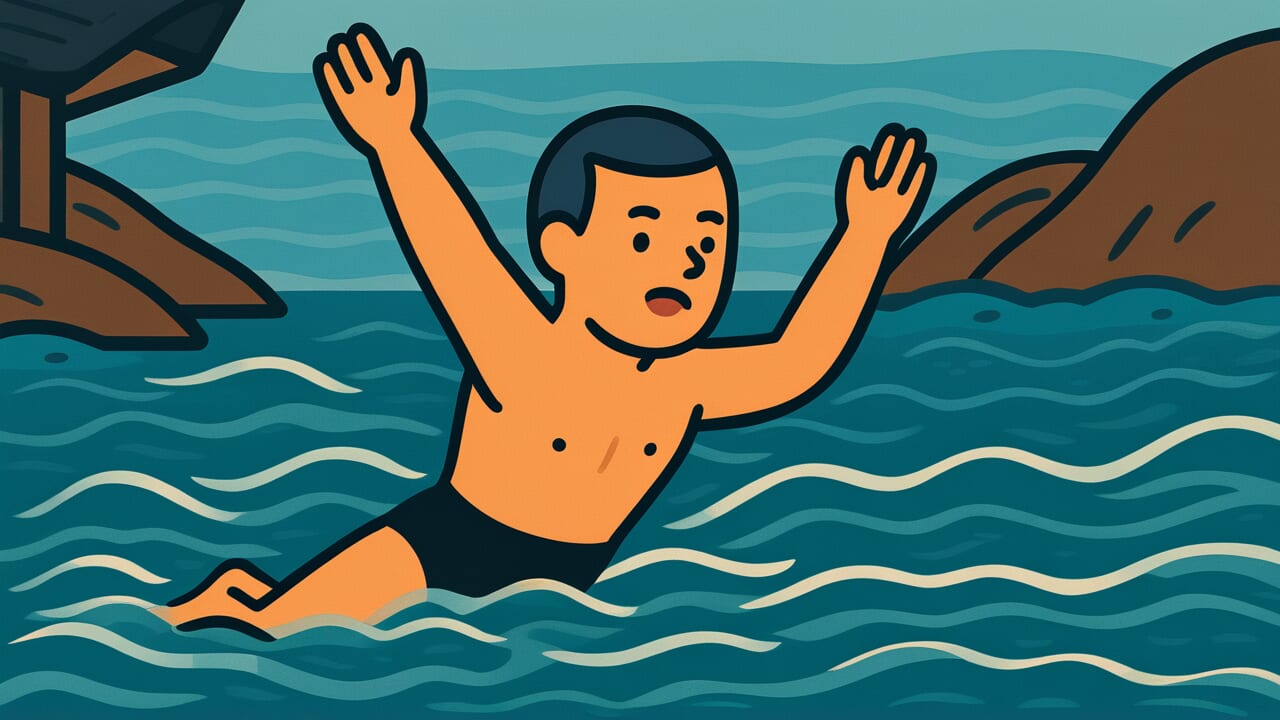How to Read “Good swimmers drown”
Yoku oyogu mono wa oboru
Meaning of “Good swimmers drown”
“Good swimmers drown” is a proverb that means people tend to fail at the things they’re best at because they let their guard down. It describes a paradoxical situation where skilled swimmers become overconfident in their abilities and neglect caution, which leads them to drown.
This proverb is used when experts or experienced people fail due to overconfidence. For example, it serves as a warning when someone with years of experience thinks “this much is fine” and neglects the basics, or when they push themselves too hard because they trust their abilities too much.
Beginners act carefully and make fewer mistakes. In contrast, skilled people are more likely to become careless. This proverb sharply points out this aspect of human nature.
Even today, we see many situations that match this proverb. Veteran drivers get into accidents. Experts overlook important details. Having skills and knowledge is wonderful, but this proverb teaches us that we must never forget the humility and carefulness that should come with them.
Origin and Etymology
The exact origin of this proverb is debated, but it’s believed to be influenced by ancient Chinese philosophy. Laozi’s “Tao Te Ching” contains ideas about how what you’re good at can bring disaster. This Eastern philosophy likely shaped the proverb as it came to Japan.
The word structure is interesting. The proverb uses “yoku,” an old Japanese word. It means more than just “well” or “skillfully.” It carries deeper meanings of “being highly skilled” or “being proud of one’s ability.”
So it doesn’t just refer to someone who can swim. It points to someone confident in swimming, someone who takes pride in their swimming skills.
The word “oboru” (to drown) is also important. By showing the paradox of a water-savvy person drowning, the proverb makes a strong impression. Similar expressions appear in Edo period moral instruction books. This suggests it was widely shared wisdom among common people.
Water transportation was well-developed in Japan. People lived closely with rivers and seas. Japanese people may have actually witnessed cases where swimming experts lost their lives due to carelessness.
Such real-life experiences likely crystallized into this proverb as a warning.
Usage Examples
- He’s a veteran, so “good swimmers drown” applies—he should review the basics
- Even with 20 years of programming experience, “good swimmers drown,” so I never skip testing
Universal Wisdom
“Good swimmers drown” has been passed down through generations because it perfectly captures a universal pitfall in human psychology.
When people master something, overconfidence inevitably sprouts somewhere in their hearts. This is an unavoidable part of human nature. When you first try something, you feel tension. You carefully check each movement. You maintain a humble attitude, fearing failure.
But as you gain experience, that thread of tension gradually loosens. The voice inside saying “it’s okay now” or “this much is no problem” grows louder and louder.
What’s interesting is that this carelessness comes not from ignorance but from expertise. You don’t fail because you don’t know. You fail precisely because you do know. This reveals the limits of human cognitive ability.
We cannot accurately measure our own abilities. Rather, as our abilities increase, that measurement becomes more distorted.
Our ancestors saw through this dangerous aspect of human psychology. They understood that skill improvement and mental carelessness are two sides of the same coin. That’s why experts must never forget their beginner’s mind.
They embedded this wisdom in the proverb. It’s not just a cautionary reminder. It’s a deep insight into the fundamental fragility of human existence.
When AI Hears This
The fact that good swimmers are more likely to drown is an interesting phenomenon explained by risk compensation theory. The human brain has a function that “tries to keep the safety margin constant.” When ability increases, people unconsciously take riskier actions.
Let’s look at specific numbers. When seatbelt use became mandatory in 1975, traffic fatality rates didn’t drop as much as expected. Research by economist Sam Peltzman showed that drivers who felt protected by seatbelts tended to drive faster and follow more closely.
In other words, as safety devices increased, people drove more dangerously to balance things out. This is risk compensation.
Expert swimmers fall into the same mechanism. Beginners only swim in shallow water, so their drowning probability is actually low. Advanced swimmers, confident that “I can swim,” challenge rough waves offshore and deep areas.
Even if skill increases tenfold, if the danger level of challenges increases more than tenfold, the accident rate actually goes up.
This theory reveals an ironic truth: ability improvement and safety don’t correlate. The more skilled people become, the more they have a psychological tendency to challenge their absolute limits. And that’s where the trap waits.
Lessons for Today
What this proverb teaches modern people is that “humility is not a privilege of beginners, but an obligation of experts.”
Whether in work or hobbies, the more skilled you become, the more you should consciously create time to return to your beginner’s mind. Precisely because you’re a veteran, check the basics. Precisely because you’ve gained experience, don’t forget caution.
That’s not cowardice. It’s true strength.
In modern society especially, technology advances rapidly. Yesterday’s common sense can become today’s nonsense. The assumption that “I understand” can become your biggest blind spot. It’s important to regularly review and update your knowledge and skills.
Also, value questions from juniors and beginners. Their simple questions may hide important perspectives you’ve overlooked. Teaching is actually the best opportunity to reexamine yourself.
Having something you’re good at is wonderful. But to protect that skill as a lifelong treasure, don’t forget humility as your safety device.



Comments